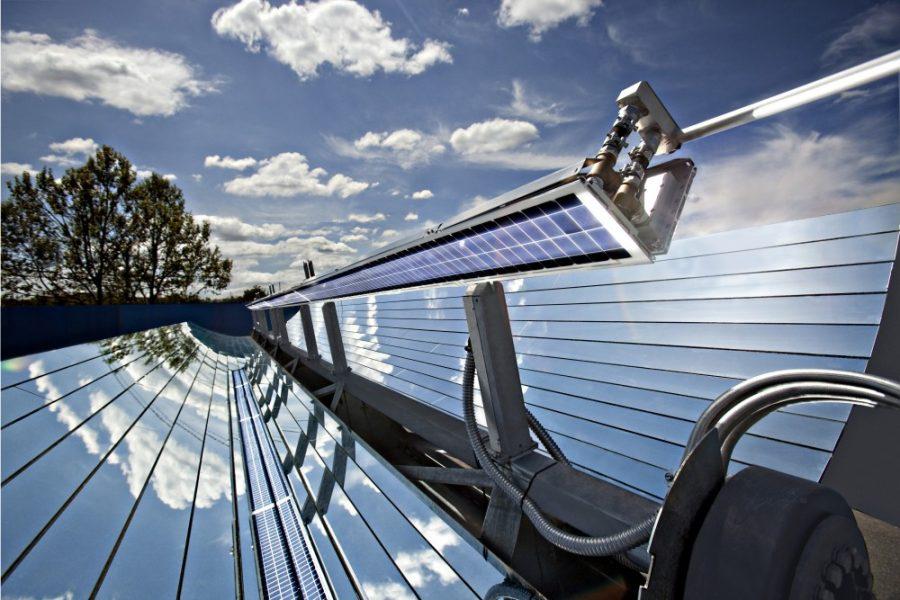Fifty cogeneration solar panels will be installed on the roof of the Villa del Puente Residence Hall in November, adding another form of solar energy to the UA’s sustainability efforts.
Cogenra Solar, a company based in Mountain View, Calif., is installing the solar panels, which will combine the traditional photovoltaic and solar hot water systems to create a much more efficient and cost-effective source of energy, according to Cogenra. The energy will provide electricity for everyday things such as lighting, showering and doing laundry. The UA is the first university in the country to collaborate with Cogenra and employ its solar solutions.
According to Cogenra Sales Engineer Eric Brown, the company usually caters to more industrial settings, but a residence hall is also ideal for cogeneration solar panels.
“Student housing is a great application,” Brown said. “Anywhere where you’re using large amounts of water on a relatively consistent basis — hospitality, health care, correctional facilities — there’s a lot of cleanup, water and general process water used in all kinds of products that consumers use on a daily basis.”
While several other residence halls were considered for the project, including Pima Residence Hall and Coronado Residence Hall, Villa del Puente proved most ideal because it houses the mechanical room and hot water tanks for all the residence halls on North Highland Avenue.
“Logistically, the hot water, the heat, the electric service for all three of those Highland halls all reside in Villa del Puente,” said Alex Blandeburgo, associate director of Residence Life and director of facilities.
The project is now in the design stages, awaiting construction drawings. Once approved by Planning, Design and Construction, the installation process will begin, which is expected to be as early as next month.
“The major construction should actually start in November,” Brown said. “We’re kind of in the final, drawing and approval stages right now, so we’ll be moving to actual on-site construction and assembly here over the next several weeks.”
As for funding, the project will cost the university virtually nothing. According to Blandeburgo, federal and state grants, as well as rebates from Tucson Electric Power, will pay for the project.
Other people on campus who have been involved with UA solar initiatives said they are enthusiastic about the installation of the cogeneration panels.
“I think it’s a really exciting opportunity because then on our campus we’d have buildings with no solar panels, buildings with solar hot water heating, and then you’d have cogen,” said Katherine Weingartner, a senior studying public management and policy with an emphasis in environmental policy. Weingartner also served as the director for Posada San Pedro Solar Powered, an effort to install solar panels in Posada San Pedro Residence Hall, earlier this year.
Weingartner has also expressed interest in utilizing cogeneration technology throughout the rest of the campus’ solar initiative projects.
“If the U of A can find outside sources of funding to put towards solar projects, I would think that they’d want to, if possible, make those cogen systems,” Weingartner said.
Student involvement is also a future possibility, though it would not have been logistically viable with this particular project.
“This was a traditional construction project, so it was definitely a task,” Brown said. “But we’re very enthusiastic about potential relations with the university, so that (student involvement) can materialize.”
According to Blandeburgo, the foreseeable results from the panels’ installation are all positive.
“I don’t see a downside at this point,” he said. “It seems that we are going to be able to, from a design perspective, get the arrays mounted on the roof and the mechanical equipment installed, with minimal impact to the environment and to the aesthetics of the facility and the surrounding grounds. Cogenra seems to be committed to ensuring that that occurs.”
Blandeburgo also said the university is enthusiastic about being the first in the country to use Cogenra’s cogeneration solutions.
“We’re very excited about it,” he added. “It’s really a win-win because it’s an opportunity to evaluate its performance, and if it is something that proves to be effective and efficient … it is a model for other universities to follow.”









